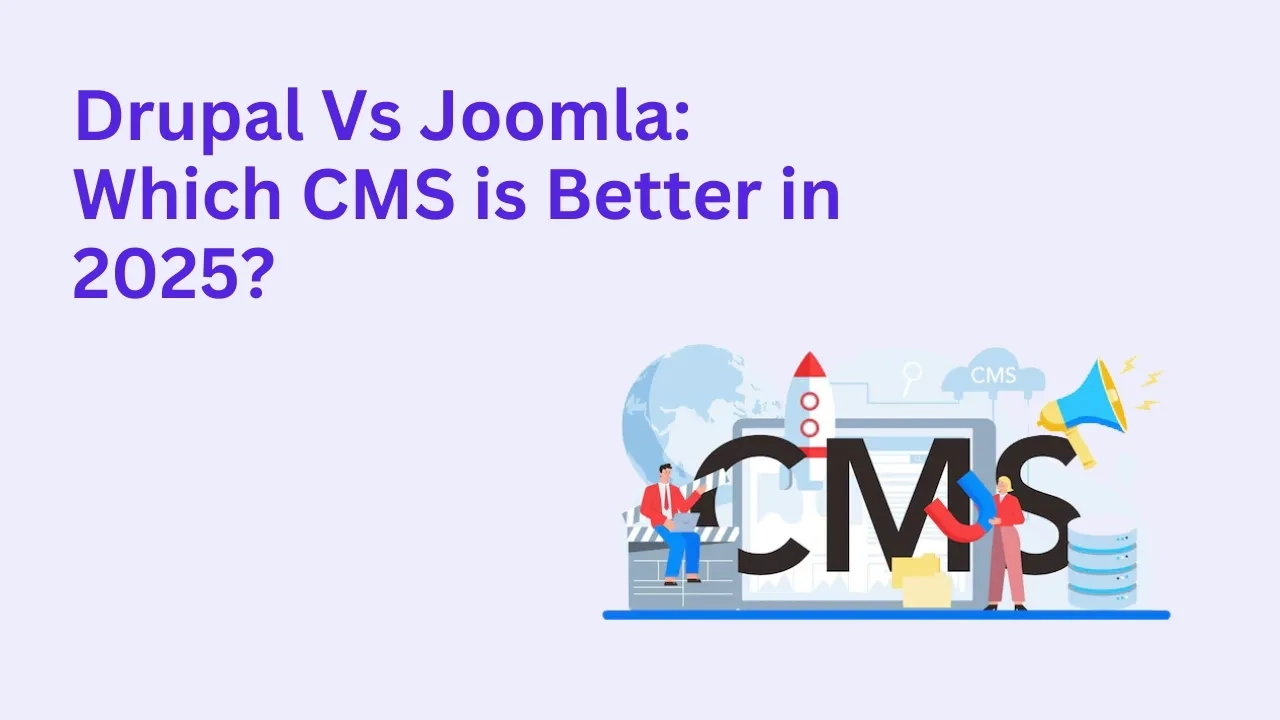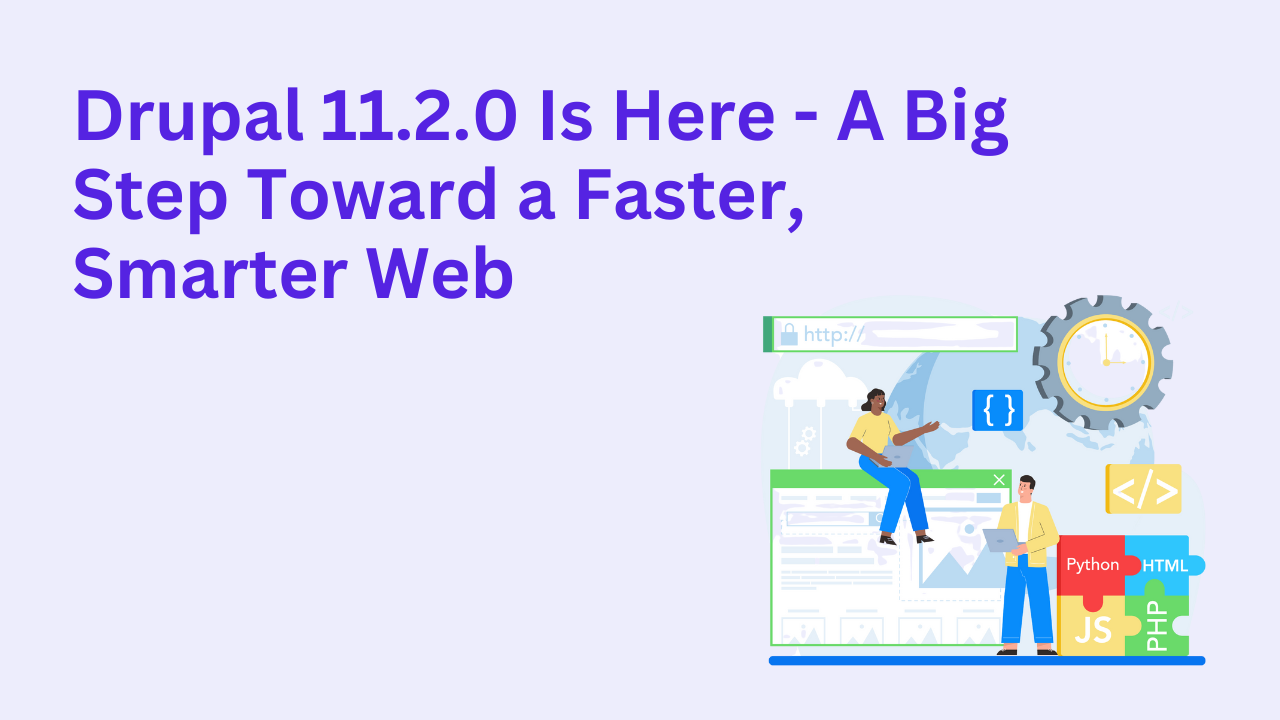Drupal Vs Joomla: Which CMS is Better in 2025?

When it comes to selecting the right content management system (CMS) for your website, the decision often narrows down to two popular options: Drupal and Joomla. Both platforms have carved out strong reputations, offering robust features for diverse use cases. But which CMS is better in 2025? In this blog, we’ll dive deep into the pros, cons, and unique capabilities of each to help you make an informed choice.
Introduction to Drupal and Joomla
What Is Drupal?
Drupal is an open-source CMS designed for building complex, scalable, and highly customizable websites. Known for its flexibility and advanced capabilities, it’s a go-to choice for developers working on enterprise-grade projects.
What Is Joomla?
Joomla is another open-source CMS that strikes a balance between user-friendliness and customization. It’s particularly popular for mid-sized websites, offering a blend of intuitive tools and advanced features.
Key Features of Drupal in 2025
1. Scalability and Flexibility
Drupal shines in handling high-traffic websites and supporting complex structures. Its modular architecture allows developers to extend functionality with ease.
2. Enhanced Security Features
In 2025, Drupal continues to be recognized for its robust security protocols, making it a trusted choice for government and financial sector websites.
3. Decoupled Architecture
Drupal’s support for decoupled or headless CMS architecture allows seamless integration with modern frameworks like React or Angular, enabling dynamic user experiences.
4. Multilingual Support
With built-in multilingual capabilities, Drupal enables websites to cater to global audiences effortlessly.
5. Advanced SEO Tools
Drupal’s SEO modules, like Pathauto and Metatag, ensure that your website is optimized for search engines.
Also read: Drupal Views Module: What Are They & How Do They Work?
Key Features of Joomla in 2025
1. User-Friendly Interface
Joomla’s admin dashboard remains intuitive, making it a popular choice for users with minimal technical expertise.
2. Versatile Extension Library
With thousands of extensions available, Joomla can cater to a wide range of website requirements.
3. Built-in Multilingual Capabilities
Like Drupal, Joomla offers strong multilingual support, enabling websites to target diverse audiences.
4. Flexible Templates
Joomla’s templating system allows for significant customization while maintaining ease of use.
5. Community Support
The Joomla community provides extensive documentation and forums, ensuring users have access to support and resources.
Drupal Vs Joomla: A Side-by-Side Comparison
1. Ease of Use
- Drupal: More complex, designed for developers and experienced users.
- Joomla: Easier for beginners, with a straightforward interface.
2. Customization
- Drupal: Superior flexibility with modules and custom coding.
- Joomla: Offers extensive customization but within a simpler framework.
3. Performance
- Drupal: Excels in handling high traffic and complex websites.
- Joomla: Suitable for mid-sized websites but can struggle with scalability.
4. Security
- Drupal: Known for enterprise-level security.
- Joomla: Secure, but not as robust as Drupal for critical applications.
5. SEO Capabilities
- Drupal: Advanced SEO modules for deep optimization.
- Joomla: Solid SEO features but less advanced compared to Drupal.
Use Cases for Drupal
- Enterprise Websites:
- Examples: Corporate portals, financial institutions, and government platforms.
- E-commerce Platforms:
- With modules like Drupal Commerce, it’s perfect for large-scale online stores.
- Media Websites:
- Ideal for news portals and content-heavy platforms.
Use Cases for Joomla
- Small-to-Medium Businesses:
- Great for startups and local businesses.
- Nonprofit Organizations:
- Simplicity and affordability make Joomla a popular choice for nonprofits.
- Community Portals:
- Built-in tools for forums and member areas make Joomla ideal for communities.
Also read: Why Choose Drupal As Your Restaurant CMS in 2025?
Why Choose Drupal in 2025?
- Unparalleled Flexibility:
- Suitable for highly customized, large-scale projects.
- Top-Tier Security:
- Perfect for industries requiring stringent data protection.
- Future-Ready:
- Decoupled architecture ensures compatibility with emerging technologies.
Why Choose Joomla in 2025?
- Ease of Use:
- Ideal for beginners and non-technical users.
- Cost-Effective:
- Affordable for small businesses and nonprofits.
- Versatility:
- Strikes a balance between simplicity and advanced features.
How to Decide Which CMS Is Right for You?
- Evaluate Your Needs:
- Complex, scalable needs? Go with Drupal.
- Simpler, user-friendly projects? Choose Joomla.
- Budget Considerations:
- Drupal projects may require higher investment in development.
- Joomla offers affordability without compromising on features.
- Long-Term Goals:
- Think about scalability, future integrations, and growth potential.
Conclusion
In the battle of Drupal vs Joomla in 2025, both CMS platforms have their strengths and ideal use cases. Drupal stands out for its scalability, security, and advanced capabilities, making it the best choice for enterprise-grade projects. Joomla, on the other hand, excels in user-friendliness and affordability, catering to small-to-medium businesses and community-driven sites.
Ultimately, your choice should align with your specific needs, technical expertise, and long-term goals. If you need expert guidance, consider reaching out to professional developers who can help you leverage the full potential of your chosen CMS.








